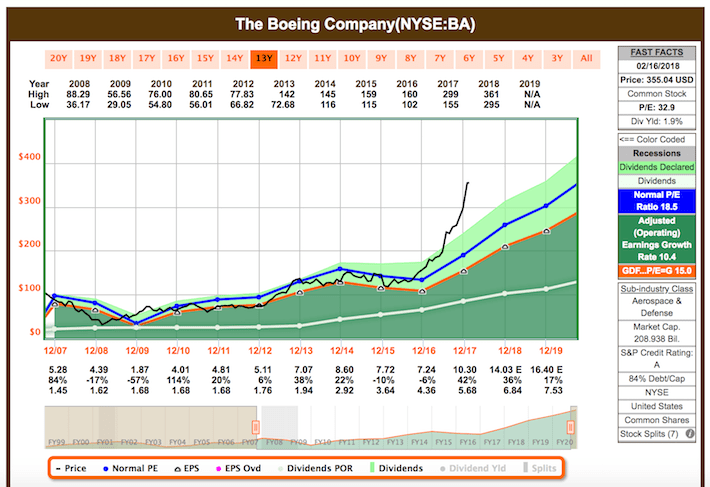
The market has bid up Boeing to ~25x 2018 EPS estimates, while Apple trades at just 15x its forward looking P/E. Because of my confidence regarding Boeing’s moat within such an attractive industry, I associate less concern; less fear, with this company.
This is why I am willing to hold my Boeing shares, which are trading for a 66% relative valuation premium to Apple’s (Boeing’s recent habit of rewarding me with ~20% annual dividend growth also helps). I went on this tangent to show why I don’t believe in hard and tight rules in the market pertaining to risk management. There are simply too many variables for such rules to work across the board. This is what I mean when I say that there is an art to portfolio management.
And getting back to my original thesis here, fear is one of the most prominent players in this art. It seems like I’m always talking about the perils associated with fear and greed in the markets. Traditionally, these have been the forces that drive markets and more often than not, the mistakes that investors make within them.
However, in this piece, I’ll be singing a different, somewhat thankful tune. You know what? We’ll take that a step further. I’ll be singing a deferential tune. Today, I’ll be focusing on the benefits that fear can bring to the conservative, income oriented investor.
Fear in the markets is generally demonized, but that’s not because of the emotion itself, it’s because of the negative reactions that it oftentimes inspires. Fear is what causes investors to sell at bottoms and/or avoid buying attractive valuation during dips.
I can’t tell you how many times I’ve heard investors say something like, “I’m waiting for a dip to buy,” only to because too fearful to take advantage of the next dip when it arrives. Buying low and selling high makes sense in principle but it’s a difficult plan to put to use practically because of the emotions that become involved with volatility perks up.
With that being said, as frustrating as fear can be sometimes with regard to unproductive inaction, it can be helpful as well. Fear is what helps us avoid dangerous situations that might be otherwise bad for our health. Fear has surely played a role in human evolution, allowing us to grow and prosper as a species into the dominant force on our planet today. Just like everything else in this world, it’s impossible to paint fear with an overarching brush. There is good and bad fear and investors must learn how to artfully deal with it.
Sometimes, it is best to throw caution to the wind. For possibly the first time ever in an investment article, I’m going to quote rapper Young Jeezy. In his song, “Scared Money” featuring Lil Wayne, Jeezy proclaims that “Scared money don’t make no money.”
I can’t be certain if Young Jeezy and Lil Wayne were talking about buying equities or not, but I’d be lying if I said that this phrase hasn’t helped me to pick up tremendous value in the market during times of high volatility.
A phrase along similar lines that is much more often quoted in the investment world, “Buy when there is blood in the streets.”
Many attribute this phrase to the Oracle of Omaha, Warren Buffett, but according to this Forbes article from 2009, the phrase was originally coined by Barron Rothschild, an 18th century British nobleman of the Rothschild banking family.
The Forbes piece goes on to say that the entire quote is actually, “”Buy when there’s blood in the streets, even if the blood is your own.”
Rothschild put his words to use, accumulating distressed assets throughout the early 19th century as Napoleon Bonaparte spread chaos across Europe during the Napoleonic Wars.
Rothschild certainly did well for himself, but I’m not saying that all investors should exude this sort of intestinal fortitude. There are certainly times when caution is merited and I suppose that living in war-torn times would be one of them.
When one experiences genuine fear for his or her life, investing may not be the best idea. Although, I suspect that the very best deals are only available during such times of incredible distress, so with proper preparation regarding asset allocation and a very disciplined outlook pertaining to long-term goals, it is possible to play the contrarian role rationally.
Yet, there are other times when fear should not be ignored. The fear of missing out is a powerful force and a potentially destructive one to wealth. The fear of missing out is a very close counterpart to greed, especially during bright, sunny days when upward momentum in the market rules the day. As I said in the intro, greed is rarely a good thing for an investor. I suspect it can lead to profits for speculators, but I doubt that’s why anyone is here reading a piece on a website focused on conservative, reliable streams of passive income.
Sometimes fear works in conjunction with greed, but other times, it can be the only force that counteracts its pull. It is perfectly logical to be fearful of future returns when the market is running hot, overvalued, and sitting at all-time highs. It is also perfectly logical to be fearful of future returns when the economy is facing major changes, like the normalization of interest rates. I think it’s fine to be fearful of change, for a moment, at least, while you attempt to analyze new data sets.
However, it’s not rational to be scared of change itself; just because sometime is different doesn’t mean that it is dangerous. My point with this article, if there is one at all, is bring up questions about fear in an attempt to prove that it isn’t necessarily evil.
Fear is surely complicated and isn’t the most enjoyable aspect of portfolio management (or the human experience) to reflect upon, but it is something that all investors must come to terms with if they’re to be successful over the long-term.
Fear can be good and bad, it can make you money, lose you money, or prohibit you from doing either. Fear is an ever present force in the markets and one that investors must learn to dance with if they’re to elegantly navigate the dance floor that is the stock market… especially when it’s blood splattered.
This post was republished with permission from Sure Dividend.
